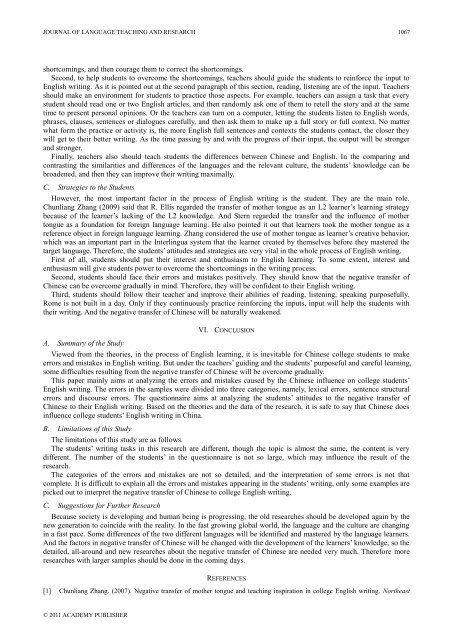Journal of Language Teaching and Research Contents - Academy ...
Journal of Language Teaching and Research Contents - Academy ...
Journal of Language Teaching and Research Contents - Academy ...
Create successful ePaper yourself
Turn your PDF publications into a flip-book with our unique Google optimized e-Paper software.
JOURNAL OF LANGUAGE TEACHING AND RESEARCH<br />
shortcomings, <strong>and</strong> then courage them to correct the shortcomings.<br />
Second, to help students to overcome the shortcomings, teachers should guide the students to reinforce the input to<br />
English writing. As it is pointed out at the second paragraph <strong>of</strong> this section, reading, listening are <strong>of</strong> the input. Teachers<br />
should make an environment for students to practice those aspects. For example, teachers can assign a task that every<br />
student should read one or two English articles, <strong>and</strong> then r<strong>and</strong>omly ask one <strong>of</strong> them to retell the story <strong>and</strong> at the same<br />
time to present personal opinions. Or the teachers can turn on a computer, letting the students listen to English words,<br />
phrases, clauses, sentences or dialogues carefully, <strong>and</strong> then ask them to make up a full story or full context. No matter<br />
what form the practice or activity is, the more English full sentences <strong>and</strong> contexts the students contact, the closer they<br />
will get to their better writing. As the time passing by <strong>and</strong> with the progress <strong>of</strong> their input, the output will be stronger<br />
<strong>and</strong> stronger.<br />
Finally, teachers also should teach students the differences between Chinese <strong>and</strong> English. In the comparing <strong>and</strong><br />
contrasting the similarities <strong>and</strong> differences <strong>of</strong> the languages <strong>and</strong> the relevant culture, the students‟ knowledge can be<br />
broadened, <strong>and</strong> then they can improve their writing maximally.<br />
C. Strategies to the Students<br />
However, the most important factor in the process <strong>of</strong> English writing is the student. They are the main role.<br />
Chunliang Zhang (2009) said that R. Ellis regarded the transfer <strong>of</strong> mother tongue as an L2 learner‟s learning strategy<br />
because <strong>of</strong> the learner‟s lacking <strong>of</strong> the L2 knowledge. And Stern regarded the transfer <strong>and</strong> the influence <strong>of</strong> mother<br />
tongue as a foundation for foreign language learning. He also pointed it out that learners took the mother tongue as a<br />
reference object in foreign language learning. Zhang considered the use <strong>of</strong> mother tongue as learner‟s creative behavior,<br />
which was an important part in the Interlingua system that the learner created by themselves before they mastered the<br />
target language. Therefore, the students‟ attitudes <strong>and</strong> strategies are very vital in the whole process <strong>of</strong> English writing.<br />
First <strong>of</strong> all, students should put their interest <strong>and</strong> enthusiasm to English learning. To some extent, interest <strong>and</strong><br />
enthusiasm will give students power to overcome the shortcomings in the writing process.<br />
Second, students should face their errors <strong>and</strong> mistakes positively. They should know that the negative transfer <strong>of</strong><br />
Chinese can be overcome gradually in mind. Therefore, they will be confident to their English writing.<br />
Third, students should follow their teacher <strong>and</strong> improve their abilities <strong>of</strong> reading, listening, speaking purposefully.<br />
Rome is not built in a day. Only if they continuously practice reinforcing the inputs, input will help the students with<br />
their writing. And the negative transfer <strong>of</strong> Chinese will be naturally weakened.<br />
A. Summary <strong>of</strong> the Study<br />
© 2011 ACADEMY PUBLISHER<br />
VI. CONCLUSION<br />
Viewed from the theories, in the process <strong>of</strong> English learning, it is inevitable for Chinese college students to make<br />
errors <strong>and</strong> mistakes in English writing. But under the teachers‟ guiding <strong>and</strong> the students‟ purposeful <strong>and</strong> careful learning,<br />
some difficulties resulting from the negative transfer <strong>of</strong> Chinese will be overcome gradually.<br />
This paper mainly aims at analyzing the errors <strong>and</strong> mistakes caused by the Chinese influence on college students‟<br />
English writing. The errors in the samples were divided into three categories, namely, lexical errors, sentence structural<br />
errors <strong>and</strong> discourse errors. The questionnaire aims at analyzing the students‟ attitudes to the negative transfer <strong>of</strong><br />
Chinese to their English writing. Based on the theories <strong>and</strong> the data <strong>of</strong> the research, it is safe to say that Chinese does<br />
influence college students‟ English writing in China.<br />
B. Limitations <strong>of</strong> this Study<br />
The limitations <strong>of</strong> this study are as follows.<br />
The students‟ writing tasks in this research are different, though the topic is almost the same, the content is very<br />
different. The number <strong>of</strong> the students‟ in the questionnaire is not so large, which may influence the result <strong>of</strong> the<br />
research.<br />
The categories <strong>of</strong> the errors <strong>and</strong> mistakes are not so detailed, <strong>and</strong> the interpretation <strong>of</strong> some errors is not that<br />
complete. It is difficult to explain all the errors <strong>and</strong> mistakes appearing in the students‟ writing, only some examples are<br />
picked out to interpret the negative transfer <strong>of</strong> Chinese to college English writing.<br />
C. Suggestions for Further <strong>Research</strong><br />
Because society is developing <strong>and</strong> human being is progressing, the old researches should be developed again by the<br />
new generation to coincide with the reality. In the fast growing global world, the language <strong>and</strong> the culture are changing<br />
in a fast pace. Some differences <strong>of</strong> the two different languages will be identified <strong>and</strong> mastered by the language learners.<br />
And the factors in negative transfer <strong>of</strong> Chinese will be changed with the development <strong>of</strong> the learners‟ knowledge, so the<br />
detailed, all-around <strong>and</strong> new researches about the negative transfer <strong>of</strong> Chinese are needed very much. Therefore more<br />
researches with larger samples should be done in the coming days.<br />
REFERENCES<br />
[1] Chunliang Zhang. (2007). Negative transfer <strong>of</strong> mother tongue <strong>and</strong> teaching inspiration in college English writing. Northeast<br />
1067

















